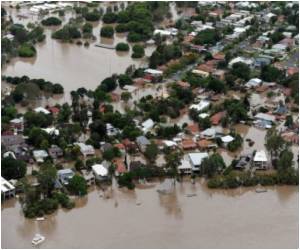Qazi Mohammad Yahya's ruined handmade carpets and Pashmina shawls are now caked with mud and soaked in putrid water, reflecting Indian Kashmir's economic devastation from the region's floods.

As the waters recede and the clean up finally begins, business owners, including those selling Indian Kashmir's most famous exports, are beginning to count their losses -- at least $5 billion by conservative estimates.
"My 35 years of earning is gone," Yahya said outside his home in the picturesque region's main city of Srinagar as water-logged carpets collected from one of his showrooms were unloaded from a truck.
"The loss is incalculable," a grim-faced Yahya added, staring at muddy bundles of what had been handspun fine cashmere wool to make Pashmina shawls.
"Most of my finest carpets are lying elsewhere in the flooded city."
Kashmir carpets have traditionally been a major earner for the region, whose generations of weavers toil for months on wooden looms to produce single intricate pieces that sell for thousands of dollars in the West.
Advertisement
But scores of carpet showrooms now lie under water after Srinagar's Dal Lake burst its banks, sending residents fleeing for higher ground. Many of the handlooms have also been destroyed and hundreds of people are out of work.
Advertisement
- 'Everything is gone' -
From carpets and saffron, another famed Kashmir export, to apples, walnuts and gold jewellery, business owners are returning to their flood-wrecked shops to find tonnes of goods gone or destroyed.
"Our most conservative estimate of loss is at least 30,000 crore rupees ($5 billion)," said Ashraf Mir, president of the Federation Chambers of Industries Kashmir (FCIK).
"Our main commercial hub (in Srinagar) was the worst hit," Mir told AFP, adding that the figures were likely to be higher because most of the Kashmir Valley's 500,000 traders under-insured their stock.
Mir himself runs a steel fabrication plant employing 100 people. "I can't support my staff under the circumstances," he said.
Mir said many business owners including farmers lost financial records, making it difficult for them to seek help from banks and other financial institutions.
"Businesses need to rebuild fast for which liberal institutional help is a must," Mir said. Many business owners were among the tens of thousands who also lost their homes.
"Minimum documents, minimum time (to provide financial help) is the key," he said.
In one of Srinagar's main and oldest markets, Maharaj Bazar, mounds of ruined dried fruits and other goods line the road as shopkeepers begin the massive clean up. The stench of rotting foodstuff hangs in the air.
"We had stocked to the fullest for the peak of marriage season in Kashmir," said shopkeeper Mehraj-u-Din, as he loaded sacks of soiled almonds, cashew nuts, saffron and dates onto a truck to be thrown into the nearby Jhelum river which is finally receding.
"Now everything is gone."
Another shopkeeper who sells saffron and other spices said he had sold off his wife's gold jewellery just before the floods to buy up more stock to cash in on the marriage season.
"That doubled my loss," Abdul Lateef said.
A few shops down, jeweller Pervez Ahmed was sifting through mounds of silt for some of the three kilograms (nearly seven pounds) of gold ornaments that had been displayed in his showroom.
"I have not been able to salvage more than 10 percent," said Ahmed who has three showrooms in the market.
"Banks and insurance offices are locked and under water. No one is coming here to assess our losses," he said.
Outside of Srinagar, farms which have long produced Kashmir apples, pears, walnuts and other food are also ruined.
The state government, criticised for its slow response to the disaster, said last week more than 80,000 hectares (200,000 acres) of crops and orchards have been destroyed in Baramulla, just one of 10 Kashmir districts, which was only mildly hit by the floods.
Source-AFP









